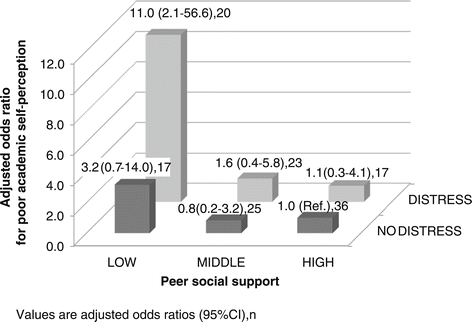Psychological distress and academic self-perception among international medical students: the role of peer social support
- PMID: 25430069
- PMCID: PMC4251849
- DOI: 10.1186/s12909-014-0256-3
Psychological distress and academic self-perception among international medical students: the role of peer social support
Abstract
Background: Psychological distress among medical students is commonly observed during medical education and is generally related to poor academic self-perception. We evaluated the role of peer social support at medical schools in the association between psychological distress and academic self-perception.
Methods: An online survey was conducted in a medical degree program for 138 international students educated in English in the Czech Republic. The Medical Student Well-Being Index was used to define the students' psychological distress. Perceived peer social support was investigated with the Multidimensional Scale of Perceived Social Support. Poor academic self-perception was defined as the lowest 30% of a subscale score of the Dundee Ready Education Environment Measure. Analyses evaluated the presence of additive interactions between psychological distress and peer social support on poor academic self-perception, adjusted for possible confounders.
Results: Both psychological distress and low peer social support were negatively associated with poor academic self-perception, adjusted for local language proficiency and social support from family. Students with psychological distress and low peer social support had an odds ratio of 11.0 (95% confidence interval (CI): 2.1-56.6) for poor academic self-perception as compared with those without distress who had high peer social support. The presence of an additive interaction was confirmed in that the joint association was four times as large as what would have been expected to be on summing the individual risks of psychological distress and low peer social support (synergy index = 4.5, 95% CI: 1.3-14.9).
Conclusions: Psychological distress and low peer social support may synergistically increase the probability of poor academic self-perception among international medical students. Promoting peer social relationships at medical school may interrupt the vicious cycle of psychological distress and poor academic performance.
Figures

References
MeSH terms
LinkOut - more resources
Full Text Sources
Other Literature Sources
Medical

